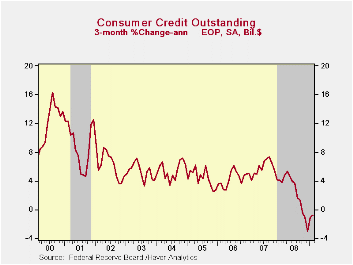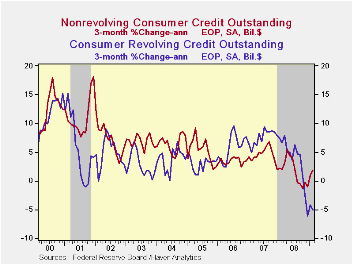 Global| Apr 07 2009
Global| Apr 07 2009Consumer Credit Usage Remains Negative
by:Tom Moeller
|in:Economy in Brief
Summary
For February the Federal Reserve reported that consumer credit outstanding fell $7.4B. As a result of the decline, which was the fifth since July, credit growth slowed to just 1.1% year-to-year which was the weakest since late 1992. [...]

For February the Federal Reserve reported that consumer credit outstanding fell $7.4B. As a result of the decline, which was the fifth since July, credit growth slowed to just 1.1% year-to-year which was the weakest since late 1992. On a three-month basis credit outstanding has followed the decline in retail spending and fallen at a 0.8% annual rate.
Non-revolving credit (autos & other consumer durables), which accounts for nearly two-thirds of the total, ticked up just $0.3B in February. However, it rose at a 1.9% rate over the last three months, a pickup from the negative growth at the end of last year. Usage of revolving credit fell a huge $7.8B in February which was a record. The decline lowered three-month growth to a negative 5.1% which was near the record.
These figures are the major input to the Fed's quarterly Flow of Funds accounts for the household sector.
Credit data are available in Haver's USECON database. The Flow of Funds data are in Haver's FFUNDS database.
Credit Storm Sinking Global Trade from the Federal Reserve Bank of Atlanta can be found here.
| Consumer Credit (m/m Chg, SAAR) | February | January | Y/Y | 2008 | 2007 | 2006 |
|---|---|---|---|---|---|---|
| Total | $-7.4B | $8.1B | 1.1% | 1.8% | 5.5% | 4.5% |
| Revolving | $-7.8B | $1.9B | 0.5% | 2.4% | 7.4% | 6.1% |
| Non-revolving | $0.3B | $6.2B | 1.4% | 1.4% | 4.4% | 3.6% |
Tom Moeller
AuthorMore in Author Profile »Prior to joining Haver Analytics in 2000, Mr. Moeller worked as the Economist at Chancellor Capital Management from 1985 to 1999. There, he developed comprehensive economic forecasts and interpreted economic data for equity and fixed income portfolio managers. Also at Chancellor, Mr. Moeller worked as an equity analyst and was responsible for researching and rating companies in the economically sensitive automobile and housing industries for investment in Chancellor’s equity portfolio. Prior to joining Chancellor, Mr. Moeller was an Economist at Citibank from 1979 to 1984. He also analyzed pricing behavior in the metals industry for the Council on Wage and Price Stability in Washington, D.C. In 1999, Mr. Moeller received the award for most accurate forecast from the Forecasters' Club of New York. From 1990 to 1992 he was President of the New York Association for Business Economists. Mr. Moeller earned an M.B.A. in Finance from Fordham University, where he graduated in 1987. He holds a Bachelor of Arts in Economics from George Washington University.
More Economy in Brief
 Global| Feb 05 2026
Global| Feb 05 2026Charts of the Week: Balanced Policy, Resilient Data and AI Narratives
by:Andrew Cates






